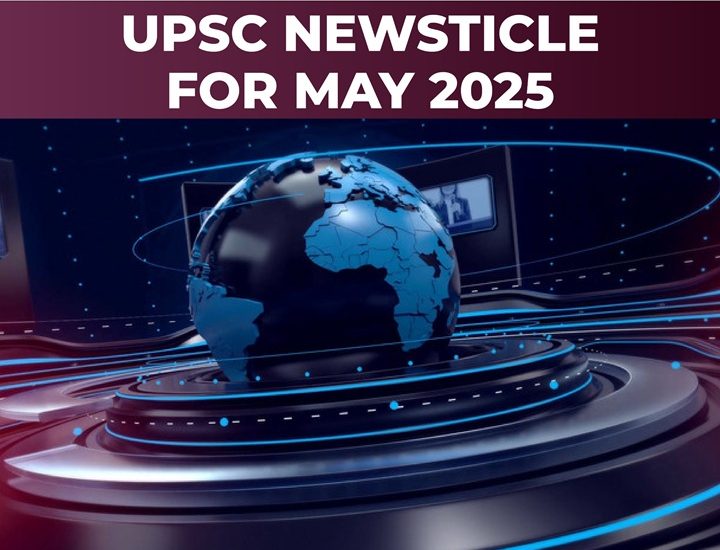
Editorials/Opinions Evaluation For UPSC 19 Could 2025
Content material :
- Robust timing
- A caste census is just not a silver bullet for social justice
Robust timing
Context & Latest Setback
- ISRO’s PSLV-C61 mission failed to launch EOS-09 into the supposed sun-synchronous orbit.
- EOS-09 was a dual-purpose satellite tv for pc — meant for civilian use (e.g., land mapping, hydrology) and defence surveillance, with an all-weather radar functionality.
- The failure within the third stage post-liftoff highlights that even well-understood launch autos like PSLV can falter.
Relevance : GS 3 ( Science and Know-how)
Apply Query : “India’s rising dependence on space-based property for each civilian and army functions requires larger funding and resilience in its house infrastructure.” Within the gentle of current mission failures, critically analyze the challenges confronted by ISRO in fulfilling its strategic aims. Recommend measures to boost India’s house capabilities.(250 Phrases)
Implications for Defence
- EOS-09 had essential army surveillance potential, particularly amid tensions with Pakistan.
- Failure displays gaps in India’s indigenous space-based surveillance, as seen throughout Operation Sindoor, which relied on overseas business satellites for tactical knowledge.
Rising Navy Calls for
- India has launched the Area-Based mostly Surveillance-3 programme:
- Goals to deploy 52 surveillance satellites.
- 31 satellites to be manufactured by the non-public sector, needing ISRO’s technical steerage and help.
Problem of the “Price-Reliability-Time” Triangle
- Area missions steadiness:
- Price (finances constraints),
- Reliability (technical success),
- Time (urgency of army/civilian calls for).
- Failures like PSLV-C61 and NVS-02 (January 2025) underscore how small errors can result in massive penalties.
Time Stress & Useful resource Constraint
- ISRO is burdened with:
- Crowded launch schedules,
- Rising army and civilian satellite tv for pc wants,
- Human spaceflight programme.
- Restricted manufacturing capability and knowledge pipeline stress worsen supply pressures.
Conclusion:
- Given rising strategic and safety roles of house property, ISRO wants:
- Elevated funding and useful resource allocation,
- Coverage help to increase infrastructure,
- Sooner integration of personal sector capacities.
- Guaranteeing well timed, dependable, and cost-effective outcomes in each civilian and army domains is essential in as we speak’s globally aggressive house race.
A caste census is just not a silver bullet for social justice
Context and Introduction
- Authorities has introduced caste enumeration within the upcoming nationwide Census.
- Broadly perceived as a step towards higher policymaking for OBCs.
- Raises concern over delayed welfare insurance policies being unjustly tied to lack of exact caste knowledge.
Relevance : GS 2 (Governance / Social Justice)
Apply Query : Do you agree {that a} caste census alone can not guarantee social justice in India? Critically look at the function of information, political will, and institutional reforms in reaching fairness for marginalized communities.(250 Phrases)
Arguments in Favour of Caste Census
- Offers empirical grounding to evaluate socio-economic standing of castes, particularly OBCs.
- May also help goal affirmative motion extra exactly.
- Could legitimize welfare insurance policies in courts, which frequently demand strong knowledge.
- Can establish intra-OBC inequalities, enabling help for EBCs.
Limitations and Critique of Over-Reliance
- Dangers overstating the utility of caste knowledge in reaching justice.
- Census is supposed to be a impartial, factual train, not a political instrument.
- Burdening the Census with political features could compromise its objectivity.
- Elevating census knowledge as a precondition for motion is a flawed method.
Historic Expertise Exhibits: Coverage ≠ Knowledge
- Many main social justice insurance policies in India, reminiscent of land reforms, reservations, and the Mandal Fee’s suggestions, have been formed extra by political will and public mobilization than by detailed statistical knowledge.
- The implementation of the EWS reservation additional illustrates that coverage selections can stem from government discretion even within the absence of complete caste-based knowledge.
Current Knowledge Already Reveals Inequalities
- SC/ST communities have lengthy been a part of the decennial census and proceed to lag in schooling, well being, and employment.
- Bihar Caste Survey and SECC have uncovered:
- Disproportionate focus in casual, low-paid sectors.
- NCRB knowledge exhibits rising crimes towards SC/STs.
- But, no main nationwide coverage shifts have been applied.
Persistent Underrepresentation
- SC/ST/OBC presence stays marginal in:
- Judiciary and better schooling
- Lack of significant reforms regardless of present knowledge.
Core Argument: Political Will > Knowledge
- Knowledge is essential however inadequate for social justice.
- Actual change requires:
- Caste census can information, however can not substitute motion.
Conclusion
- Caste census must be a routine statistical train, not the central pillar of policymaking.
- With out strong political will, knowledge stays passive.
- The true check lies in implementing daring insurance policies to uplift the most marginalised, not simply documenting their plight.
Leave a Reply